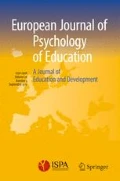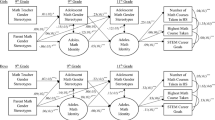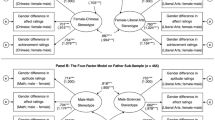Abstract
We measured age and gender differences in children’s awareness and endorsement of gender stereotypes about math, science, and verbal abilities in 463 fourth, sixth, and eighth graders. Children reported their perceptions of adults’ beliefs and their own stereotypes about gender differences in academic abilities. Consistent with study hypotheses, fourth and sixth graders had a stronger tendency than eighth graders to favor their own gender group rather than report traditional stereotypes. On average, girls favored girls over boys in all three domains. Fourth grade boys favored boys in all three domains; middle school boys reported traditional verbal stereotypes and were on average egalitarian in beliefs about math and science. Children’s reports of their perceptions of adults’ stereotypes mirrored age and gender differences in their own stereotypes and were correlated with their own stereotype endorsement. In addition to showing beliefs favoring girls in verbal domains and a tendency for most age and gender groups to not endorse traditional math and science stereotypes, the results support a synthesis of developmental and social identity theories regarding individual differences in children’s stereotype endorsement. Children’s tendency to favor girls in verbal domains may contribute to gender differences in educational and career choices by pulling girls toward the humanities and social sciences and discouraging boys from pursuing those domains.
Similar content being viewed by others
References
Ames, D. R. (2004). Strategies for social inference: a similarity contingency model of projection and stereotyping in attribute prevalence estimates. Journal of Personality and Social Psychology, 87, 573–585.
Bhanot, R., & Jovanovic, J. (2005). Do parents’ academic gender stereotypes influence whether they intrude on their children’s homework? Gender Roles, 52(9/10), 597–607.
Bleeker, M. M., & Jacobs, J. E. (2004). Achievement in math and science: do mothers’ beliefs matter 12 years later? Journal of Educational Psychology, 96, 97–109.
Chatard, A., Guimond, S., & Selimbegovic, L. (2007). “How good are you in math?” The effect of gender stereotypes on students’ recollection of their school marks. Journal of Experimental Social Psychology, 43, 1017–1024.
Chatard, A., Selimbegovic, L., Konan, P., & Mugny, G. (2008). Performance boosts in the classroom: stereotype endorsement and prejudice moderate stereotype lift. Journal of Experimental Social Psychology, 44, 1421–1424.
Cvencek, D., Meltzoff, A. N., & Greenwald, A. G. (2011). Math-gender stereotypes in elementary school children. Child Development, 82, 766–779.
Devine, P. G. (1989). Stereotypes and prejudice: their automatic and controlled components. Journal of Personality and Social Psychology, 56, 5–18.
Devine, P. G., & Elliot, A. J. (1995). Are racial stereotypes really fading? The Princeton trilogy revisited. Personality and Social Psychology Bulletin, 21, 1139–1150.
Eccles, J. S., Lord, S., & Midgley, C. (1991). What are we doing to early adolescents? The impact of educational contexts on early adolescents. American Journal of Education, 99, 521–542.
Evans, A. B., Copping, K. E., Rowley, S. J., & Kurtz-Costes, B. (2011). Academic self-concept in Black adolescents: do race and gender stereotypes matter? Self and Identity, 10, 263–277.
Gunderson, E. A., Ramirez, G., Levine, S. C., & Beilock, S. L. (2012). The role of parents and teachers in the development of gender-related math attitudes. Sex Roles, 66, 153–166.
Heyman, G. D., & Legare, C. H. (2004). Children's beliefs about gender differences in the academic and social domains. Sex Roles, 50, 227–236.
Jacobs, J. E. (1991). Influence of gender stereotypes on parent and child ability beliefs in three domains. Journal of Personality and Social Psychology, 63, 932–944.
Kessels, U. (2005). Fitting into the stereotype: how gender-stereotyped perceptions of prototypic peers relate to liking for school subjects. European Journal of Psychology of Education, 20, 309–323.
Kurtz-Costes, B., Rowley, S. J., Harris-Britt, A., & Woods, T. A. (2008). Math/science gender stereotypes and students’ self-perceptions of ability. Merrill Palmer Quarterly, 54, 386–410.
Lee, J., Grigg, W., Dion, G. (2007). The nation’s report card: Mathematics 2007. Wash, DC: National Center for Education Statistics, Institute of Education Sciences, U.S. Department of Education.
Legewie, J., & DiPrete, T. A. (2012). School context and the gender gap in educational achievement. American Sociological Review, 77, 463–485.
Lupart, J. L., Cannon, E., & Telfer, J. A. (2004). Gender differences in adolescent academic achievement, interests, values, and life-role expectations. High Ability Studies, 15, 25–42.
Martinot, D., & Désert, M. (2007). Awareness of a gender stereotype, personal beliefs, and self-perceptions regarding math ability: when boys do not surpass girls. Social Psychology of Education, 10, 455–471.
Martinot, D., Bagès, C., & Désert, M. (2012). French children’s awareness of gender stereotypes about mathematics and reading: when girls improve their reputation in math. Sex Roles, 66, 210–219.
Meece, J. L., Wigfield, A., & Eccles, J. S. (1997). Predictors of math anxiety and its influence on young adolescents’ course enrollment intentions and performance in mathematics. Journal of Educational Psychology, 82, 60–70.
Meece, J., Glienke, B., & Burg, S. (2006). Gender and motivation. Journal of School Psychology, 44(5), 351–373.
Muzzatti, B., & Agnoli, F. (2007). Gender and mathematics: attitudes and stereotype threat Susceptibility in Italian children. Developmental Psychology, 43, 747–759.
National Center for Education Statistics (NCES) (2009). NAEP 2008. Trends in academic progress. Washington, DC: U.S. Department of Education, (NCES 2009–479).
National Science Foundation (2010). Survey of Graduate Students and Postdoctorates in Science and Engineering. National Center for Science and Engineering Statistics. http://www.nsf.gov/statistics/wmpd/2013/pdf/tab3-1.pdf.
National Science Foundation. (2008). An overview of science, engineering, and health graduates: 2006. (NSF Rep. No. 08–304). Arlington: National Science Foundation.
Nosek, B. A., Smyth, F. L., Sriram, N., Lindner, N. M., Devos, T., Ayala, A., et al. (2009). National differences in gender-science stereotypes predict national differences in science and math achievement. Proceedings of the National Academy of Sciences, 108, 10593–10597.
Organization for Economic Cooperation and Development (OECD) (2011). PISA 2009 at a glance. OECD Publishing. doi:10.1787/9789264095298-en.
Patel, N., Kurtz-Costes, B., & Wood, D. (2011). Academic gender stereotypes and academic self-concept of Indian adolescents. Journal of All India Association for Educational Research, 23, 1–10.
Plante, I., Théorét, M., & Eizner Favreau, O. (2009). Student gender stereotypes: contrasting the perceived maleness and femaleness of mathematics and language. Educational Psychology, 29, 385–405.
Räty, H., & Kasanen, K. (2007). Gendered views of ability in parents’ perceptions of their children’s competencies. Gender Roles, 56, 117–124.
Rogoff, B. (2003). The cultural nature of human development. New York: Oxford University Press.
Rosenthal, R. (1994). Interpersonal expectancy effects: a 30-year perspective. Current Directions in Psychological Science, 3, 176–179.
Rowley, S. J., Kurtz-Costes, B., Mistry, R., & Feagans, L. (2007). Social status as a predictor of race and gender stereotypes in late childhood and early adolescence. Social Development, 16, 150–168.
Ruble, D., Martin, C. L., & Berenbaum, S. A. (2006). Gender development. In N. Eisenberg, W. Damon, & R. M. Lerner (Eds.), Handbook of child psychology: social, emotional, and personality development (6th ed., Vol. 3, pp. 864–911). New Jersey: Wiley.
Steele, C. (1997). A threat in the air: how stereotypes shape the intellectual identities and performance of women and Blacks. American Psychologist, 52, 613–629.
Steffens, M. C., Jelenec, P., & Noack, P. (2010). On the leaky math pipeline: comparing implicit math-gender stereotypes and math withdrawal in female and male children and adolescents. Journal of Educational Psychology, 102, 947–963.
Swinton, A. D., Kurtz-Costes, B., Rowley, S. J., & Okeke-Adeyanju, N. (2011). A longitudinal examination of African American adolescents’ attributions about achievement outcomes. Child Development, 82, 1486–1500.
Tajfel, H. (1970). Experiments in intergroup discrimination. Scientific American, 233, 96–102.
Tiedemann, J. (2000). Parents’ gender stereotypes and teachers’ beliefs as predictors of children’s concept of their mathematical ability in elementary school. Journal of Educational Psychology, 92, 144–151.
Tomasetto, C., Alparone, F. R., & Cadinu, M. (2011). Girls’ math performance under stereotype threat: the moderating role of mothers’ gender stereotypes. Developmental Psychology, 47, 943–949.
Wang, M.-T., Eccles, J. S., & Kenny, S. (2013). Not lack of ability but more choice: individual and gender differences in choice of careers in science, technology, engineering, and mathematics. Psychological Science, 24, 770–775.
Acknowledgments
Data collection for this study was supported by NIMH Grant # P50 MH52429 awarded to Robert Cairns. The writing of this report was supported by Grant # DRL-0819079 from the National Science Foundation awarded to Beth Kurtz-Costes and Stephanie Rowley. Any opinions, findings, and conclusions or recommendations expressed in this material are those of the authors and do not necessarily reflect the views of the National Science Foundation.
Author information
Authors and Affiliations
Corresponding author
Additional information
Beth Kurtz-Costes. Department of Psychology, University of North Carolina, CB 3270, Chapel Hill, NC 27599–3270 USA, bkcostes@ad.unc.edu, http://www.unc.edu/∼bkcostes/
Current themes of research:
Academic stereotypes. Gender. Race. Achievement motivation.
Most relevant publications in the field of Psychology of Education:
Copping, K. E., Kurtz-Costes, B., Rowley, S. J., & Wood, D. A. (2013). Age and race differences in racial stereotype endorsement and awareness, Journal of Applied Social Psychology, 43(5), 971–980.
Rouland, K. T., Rowley, S. J., & Kurtz-Costes, B. (2013). Self-views of African American youth are related to the gender stereotypes and ability attributions of their mothers. Self and Identity, 12, 382–396.
Evans, A. B., Copping, K. E., Rowley, S. J., & Kurtz-Costes, B. (2011). Self-concept in Black adolescents: Do race and gender stereotypes matter? Self and Identity, 10, 263–277.
Kurtz-Costes, B., Rowley, S. J., Harris-Britt, A., & Woods, T. A. (2008). Gender stereotypes about mathematics and science and self-perceptions of ability in late childhood and early adolescence. Merrill Palmer Quarterly, 54, 386–409.
Rowley, S. J., Kurtz-Costes, B., Mistry, R., & Feagans, L. (2007). Social status as a predictor of race and gender stereotypes in late childhood and early adolescence. Social Development, 16, 150–168.
Kristine E. Copping. (Institution: Department of Psychology, Huntingdon College), 1500 East Fairview Ave., Montgomery, AL 36106 USA, kcopping@huntingdon.edu, http://www.huntingdon.edu/aboutProfile.aspx?id = 2985
Current themes of research:
Academic stereotypes. Gender. Mathematics motivation.
Most relevant publications in the field of Psychology of Education:
Copping, K. E., Kurtz-Costes, B., Rowley, S. J., & Wood, D. A. (2013). Age and race differences in racial stereotype endorsement and awareness, Journal of Applied Social Psychology, 43(5), 971–980.
Evans, A. B., Copping, K. E., Rowley, S. J., & Kurtz-Costes, B. (2011). Self-concept in Black adolescents: Do race and gender stereotypes matter? Self and Identity, 10, 263–277.
Wood, D. A., Kurtz-Costes, B., & Copping, K. E. (2011). Motivational pathways to college for African American youth: A test of expectancy-value theory. Developmental Psychology, 47, 961–968.
Stephanie J. Rowley. (Institution: Department of Psychology, University of Michigan), 530 Church St.. Ann Arbor, MI 48109–1043 USA, srowley@umich.edu, http://www.soe.umich.edu/people/profile/rowleys_stephanie/
Current themes of research:
Academic stereotypes. Racial socialization. Parenting.
Most relevant publications in the field of Psychology of Education:
Rouland, K. T., Rowley, S. J., & Kurtz-Costes, B. (2013). Self-views of African American youth are related to the gender stereotypes and ability attributions of their mothers. Self and Identity, 12, 382–396.
Matthews, J.S., Kizzie, K.T., Rowley, S.J., & Cortina, K. (2010). African American boys: Understanding the literacy gap predicting academic trajectories and evaluating learning-related skills. Journal of Educational Psychology. 102, (3),757-771.
Evans, A. B., Copping, K. E., Rowley, S. J., & Kurtz-Costes, B. (2011). Academic stereotypes in Black and White youth: Do race and gender stereotypes matter? Self and Identity. 10 (2), 263–277.
Kurtz-Costes, B., Rowley, S. J., Harris-Britt, A., & Woods, T. A. (2008). Gender stereotypes about mathematics and science and self-perceptions of ability in late childhood and early adolescence. Merrill Palmer Quarterly, 54, 386–409.
Rowley, S. J., Kurtz-Costes, B., Mistry, R., & Feagans, L. (2007). Social status as a predictor of race and gender stereotypes in late childhood and early adolescence. Social Development, 16, 150–168.
C. Ryan Kinlaw. (Institution: Department of Psychology, Marist College), 3399 North Rd., Marist College, Poughkeepsie, NY 12601 USA Ryan.Kinlaw@marist.edu, http://www.marist.edu/sbs/facviewer.html?uid = 307
Current themes of research:
Intelligence theory. Technology and education. Achievement motivation.
Most relevant publications in the field of Psychology of Education:
Kinlaw, C. R., Kurtz-Costes, B., & Goldman-Fraser, J. (2001). Mothers’ achievement beliefs and behaviors and their children’s school readiness: A cultural comparison. Journal of Applied Developmental Psychology, 22, 493–506.
Kinlaw, C. R., & Kurtz-Costes, B. (2003). The development of children’s beliefs about intelligence. Developmental Review, 23, 125–161.
Kurtz-Costes, B., McCall, R. J., Kinlaw, C. R., Wiesen, C. A., & Joyner, M. H. (2005). What does it mean to be smart? The development of children’s beliefs about intelligence in Germany and the United States. Journal of Applied Developmental Psychology, 26, 217–233.
Kinlaw, C. R., & Kurtz-Costes, B. (2007). Children’s theories of intelligence: Beliefs, goals, and motivation in the elementary years. Journal of General Psychology, 134, 295–311.
Kinlaw, C. R., Dunlap, L. L., & D’Angelo, J. (2012). Relations between faculty use of online academic resources and student class attendance. Computers & Education. 59, 167–172.
Rights and permissions
About this article
Cite this article
Kurtz-Costes, B., Copping, K.E., Rowley, S.J. et al. Gender and age differences in awareness and endorsement of gender stereotypes about academic abilities. Eur J Psychol Educ 29, 603–618 (2014). https://doi.org/10.1007/s10212-014-0216-7
Received:
Revised:
Accepted:
Published:
Issue Date:
DOI: https://doi.org/10.1007/s10212-014-0216-7




